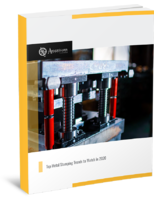MIPI M-PHY v3.1 Test Solution complies with standard requirements.
Press Release Summary:
MIPI M-PHY® v3.1 specification physical layer transmitter characterization and debug solution includes support for MIPI M-PHY High Speed Gears 1, 2, and 3; PWM Mode (G0-G7); and SYS Mode. For testing MIPI M-PHY transmitters running in high-speed mode, solution works with Tektronix MSO/DPO 70000DX oscilloscopes and P7600 series TriMode™ probes with rise time 3X faster than signal rise time, sensitivity of 200 mV(FS), minimal added noise (<1 or 2 mVrms), and high return loss.
Original Press Release:
Tektronix Releases First Test Solution for MIPI M-PHY® Specification v3.1
Tektronix MSO/DPO70000DX Oscilloscopes, P7600 Series TriMode(TM) Probes Offer Industry's Lowest Noise Solution for M-PHY Measurements
BEAVERTON, Ore. -- Tektronix, Inc., the world's leading manufacturer of oscilloscopes, today announced the first physical layer transmitter characterization and debug solution for the MIPI M-PHY(®) v3.1 specification recently approved by the MIPI® Alliance. The new Tektronix solution includes support for MIPI M-PHY High Speed Gears 1, 2 and 3, PWM Mode (G0-G7), and SYS Mode and offers the industry's lowest noise solution for MIPI M-PHY measurements when used with Tektronix MSO/DPO 70000DX oscilloscopes and P7600 series probes.
MIPI M-PHY serial interface technology is gaining broad adoption for next generation mobile devices, offering high bandwidth, low pin count and very good power efficiency. The latest v3.1 specification provides an even more robust low power PHY and presents some significant challenges for oscilloscope measurements and probing including minimizing common mode loading on the device under test (DUT) and signal fidelity requirements such as wide bandwidth, low noise, and high sensitivity. Tektronix solutions are uniquely positioned to meet the needs of engineers testing next generation MIPI M-PHY transmitters.
"We're seeing a growing emphasis on performance in mobile device design, meaning that more and more designs are incorporating MIPI M-PHY Gear 3 to operate at the highest data rate possible under the MIPI M-PHY specifications," said Brian Reich, general manager, Performance Oscilloscopes, Tektronix. "This in turn has introduced new signal acquisition challenges due to the combination of low amplitude signals and high-speeds. Tektronix probing solutions are significantly ahead of the industry and fully meet MIPI M-PHY v3.1 requirements."Â
Testing MIPI M-PHY transmitters running in high-speed mode requires a scope and probe system with rise time 3X faster than the signal rise time, sensitivity of 200 mV(FS,) minimal added noise (<1 or 2 mV(rms)), and high return loss as specified in the MIPI M-PHY standard. Tektronix MSO/DPO 70000DX oscilloscopes and P7600 Series TriMode probes are the only measurement system available that can meet these requirements while also providing convenient and consistent bus termination for HS measurements with low noise and high sensitivity. The closest alternative has 10X worse sensitivity (Tektronix: 35 mVfs vs. Competition: 360mVfs) and adds 4X more noise (Tektronix: <1mVrms vs. Competition: 4 mVrms) to the signal.
Ready for higher-speeds
Looking forward, MIPI Alliance is developing the next generation M-PHY HS Gear 4 that will increase data rates. This will introduce the need for new measurement methodologies and equalization techniques. Characterization of the bit error ratio (BER) of devices requires a breakdown of the impact of both jitter and noise. At the receiver side, the eye will be completely closed due to attenuation of the signal and equalization will be needed. Tektronix analysis solutions, DPOJET and SDLA (Serial Data Link Analysis), are well positioned to meet these needs by providing both jitter and noise analysis displayed using full contours, along with receiver equalization for HS Gear 4.
For debug and analysis, the Tektronix M-PHYTX test solution along with Tektronix Visual Trigger and DPOJET Jitter and Timing Analysis enables engineers to quickly and confidently identify and debug issues during device characterization. For MIPI M-PHY receiver testing, Tektronix offers both BERT and cost-saving Arbitrary Waveform Generator (AWG) solutions. Competitive offerings are limited to BERT-based options.
In addition, Tektronix with its solution partner Prodigy provides a protocol decode solution for SSIC, the bus interface between the applications processor and interfaces such as modem, companion chips and wireless LAN. Tektronix also provides full protocol decode and analysis solution for MIPI M-PHY, MIPI DigiRF?v4, MIPI UniPro ?and MIPI LLI protocols.
Pricing & Availability
Option MIPI M-PHY is available now worldwide. Pricing for the new option is $1,220 US MSRP.
Wondering what else Tektronix is up to? Check out the Tektronix Bandwidth Banter blog and stay up to date on the latest news from Tektronix on Twitter and Facebook.
About Tektronix
For more than sixty-five years, engineers have turned to Tektronix for test, measurement and monitoring solutions to solve design challenges, improve productivity and dramatically reduce time to market. Tektronix is a leading supplier of test equipment for engineers focused on electronic design, manufacturing, and advanced technology development. Headquartered in Beaverton, Oregon, Tektronix serves customers worldwide and offers award-winning service and support. Stay on the leading edge at www.tektronix.com.
Tektronix is a registered trademark of Tektronix, Inc. MIPI® and MIPI M-PHY® are registered trademarks owned by the MIPI® Alliance. MIPI DigiRF? and MIPI UniPro? are service marks of the MIPI Alliance.All other trade names referenced are the service marks, trademarks or registered trademarks of their respective companies.
CONTACT:
Amy Higgins
PR Manager
Tektronix
ahiggins@tektronix.com
503.627.6497




